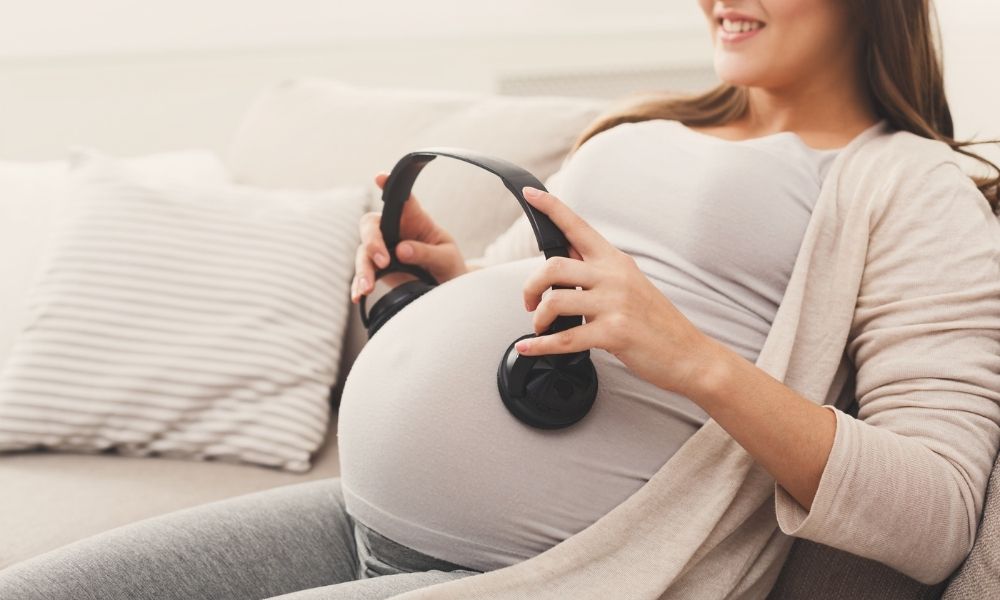Why does morning sickness happen?
Despite its name, morning sickness doesn’t only strike in the morning. Symptoms can appear at any time of day, especially in the first trimester. Up to 70–80% of pregnant women experience some degree of nausea and vomiting (NICE, 2021).
The leading scientific explanation points to hormonal changes – particularly rising levels of human chorionic gonadotropin (hCG) and oestrogen. These hormones play a crucial role in supporting early pregnancy, but they also interact with the digestive system and brain chemistry in ways that may trigger nausea (Gadsby et al., 2020).
Evolutionary theories
Some researchers suggest morning sickness may have evolved as a protective mechanism. The aversion to certain foods – like meat, strong spices, or bitter flavours – could have helped pregnant women avoid substances that might harm a developing foetus during its most vulnerable stage. In fact, studies show that nausea tends to peak between weeks 6 and 12 of pregnancy, when foetal organs are forming (Flaxman & Sherman, 2000).
Risk factors and severity
Morning sickness can vary dramatically. Some women experience mild queasiness, while others develop hyperemesis gravidarum, a severe form that can require hospital treatment. Factors such as carrying twins, a history of motion sickness, or family history may increase likelihood or severity (Royal College of Obstetricians and Gynaecologists, 2016).
Managing symptoms
While there’s no one-size-fits-all solution, UK health guidance suggests trying these strategies:
- Eating small, frequent meals rather than large ones
- Keeping plain snacks (like crackers) by the bed to eat before getting up
- Staying hydrated by sipping water or ginger tea
- Avoiding strong odours and triggers
For more severe cases, GPs may prescribe anti-sickness medication considered safe in pregnancy (NHS, 2022).
When to seek help
If you find yourself unable to keep food or fluids down, are losing weight, or feel faint, it’s important to contact your GP or midwife. Severe morning sickness is treatable, and support is available.
Emerging research
Scientists are beginning to explore new frontiers in understanding morning sickness:
- Genetic links: Studies have identified specific genetic variants associated with increased risk of hyperemesis gravidarum, suggesting a hereditary component (Fejzo et al., 2018).
- Gut microbiome: Research is investigating whether gut bacteria composition influences nausea in pregnancy, opening potential avenues for probiotic-based treatments (Aghaeepour et al., 2022).
- Long-term outcomes: There’s growing evidence that while challenging, morning sickness may be linked to a slightly lower risk of miscarriage, suggesting a potential protective role (Zhou et al., 2021).
If you’d like more support or advice, these resources may help:
- NHS Morning Sickness Guide
- Royal College of Obstetricians and Gynaecologists: Green-top Guideline No. 69
- Pregnancy Sickness Support UK charity
The bottom line
Morning sickness may feel overwhelming, but for many women, it’s a sign that pregnancy hormones are doing their job. Understanding the science behind it can help you feel less alone – and more prepared to manage it. If symptoms are affecting your daily life, remember you don’t need to suffer in silence. Support is available through your healthcare team.
References
- NICE (2021). Nausea and vomiting in pregnancy: diagnosis and management. National Institute for Health and Care Excellence.
- Gadsby, R., Barnie-Adshead, A. M., & Jagger, C. (2020). Pregnancy nausea related to hormone levels. BMJ.
- Flaxman, S. M., & Sherman, P. W. (2000). Morning sickness: a mechanism for protecting mother and embryo. Quarterly Review of Biology, 75(2).
- Royal College of Obstetricians and Gynaecologists (2016). The Management of Nausea and Vomiting of Pregnancy and Hyperemesis Gravidarum. Green-top Guideline No. 69.
- NHS (2022). Morning sickness. NHS UK.
- Fejzo, M. S., et al. (2018). Genetic analysis of hyperemesis gravidarum. Nature Communications.
- Aghaeepour, N., et al. (2022). Pregnancy and the microbiome. Frontiers in Cellular and Infection Microbiology.
- Zhou, Q., et al. (2021). Nausea and vomiting in pregnancy and risk of miscarriage. Human Reproduction.
If you’re trying to conceive (TTC), you probably know that there are certain foods and nutrients that become especially important once you’re pregnant. But nutrition plays a vital role even when trying to conceive, much like laying a strong foundation before constructing a house.
Certain nutrients create that foundation by supporting egg and sperm health (yes, nutrition matters for both partners), hormone balance and creating a hospitable environment for a fertilized egg to implant. In fact, studies show that certain nutrients can help increase fertility and improve success rates for both natural conception and fertility treatments.
In other words, nutrition is a key player in the TTC journey, but getting the right nutrients in the right quantities can be tricky. That’s where supplements come in. Just as you’d take a multivitamin to fill in nutritional gaps for optimal health, fertility supplements can give you that extra nutrient boost.
Choosing supplements for your fertility journey
When choosing a supplement to support your fertility journey, look for science-backed, high-quality ingredients. Our editors are careful to select and partner with brands that use ingredients that have been clinically studied to support fertility. Eu Natural® (pronounced you) covers all those bases and more. We love knowing that Eu Natural® products contain zero artificial additives, binders, or fillers and are lab-tested to ensure purity and potency.

When choosing a supplement to support your fertility journey, look for science-backed, high-quality ingredients. Our editors are careful to select and partner with brands that use ingredients that have been clinically studied to support fertility. Eu Natural® (pronounced you) covers all those bases and more. We love knowing that Eu Natural® products contain zero artificial additives, binders, or fillers and are lab-tested to ensure purity and potency.





%20(7).png)
.jpg)
.jpg)
.jpg)



%20copy.jpg)
